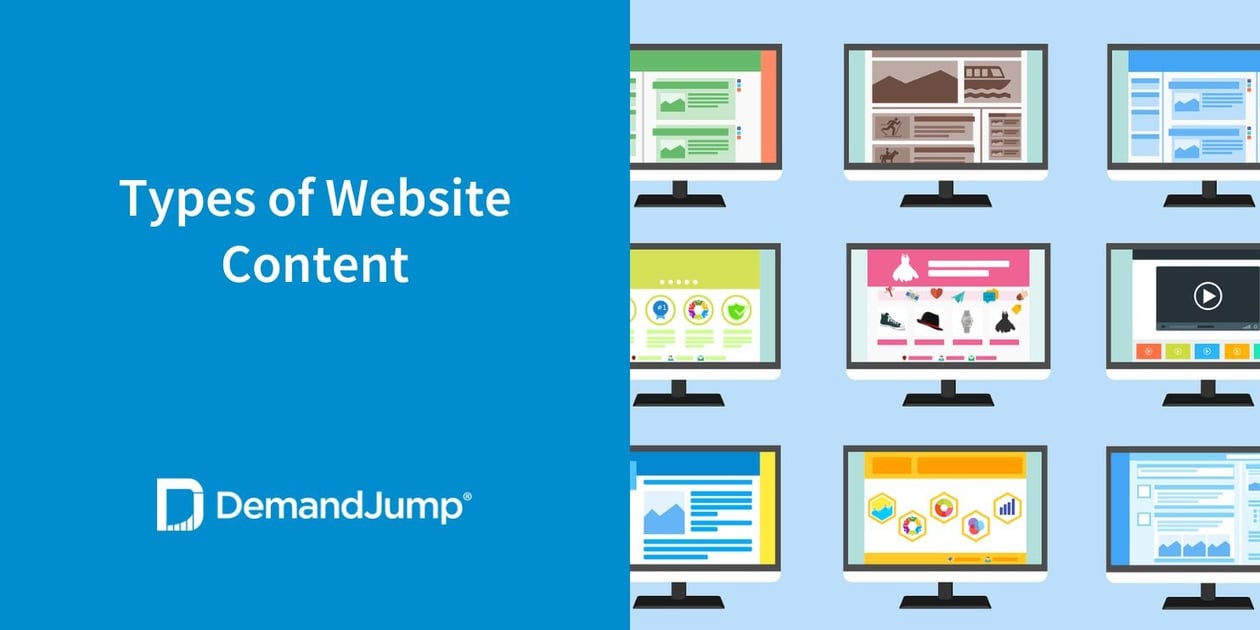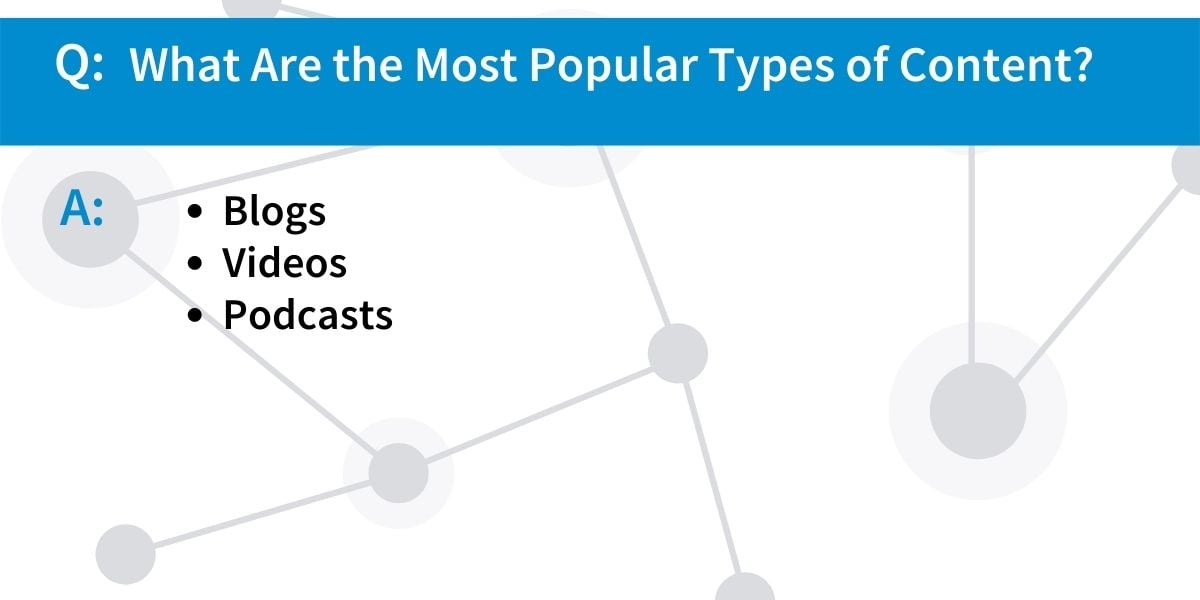Types of Website Content
January 10, 2023 •Jeremy Flick

Writing blogs and producing videos or podcasts seems almost unavoidable for businesses on the internet. Businesses are frequently interacting with their audience on social media or YouTube comments and posting blogs about all sorts of topics. Should you be doing the same?
Creating solid website content is important to reach an audience. With the ultimate goal of driving traffic and converting sales, content is almost essential. So, yes! You should be boosting your website with different types of content writing!
But what type of content is best? Should you focus on the most popular content on the internet? We’ll get there in a moment, but let’s first define what website content is and how it impacts your business.
What is Web Content?
Web content is the text, videos, and other informative and (hopefully) creative elements on your website and other outlets, like social media. Most often, website content is posted to blog pages and landing pages for easy access to information. But even the About Me section is a type of written content—though that isn’t typically what’s driving traffic to your website. When examining web content, you should focus on what draws in your audience from search engines like Google and social media channels. This means the most important elements of the website are your high-value, informative content. If it is high-value, your content will drive organic traffic to your site using SEO to its advantage. So, what types of content should you focus on for your website?

What Are the Three Types of Web Content?
When creating web content, it’s important to know what will drive the most traffic to your website. Your audience might be different than other businesses, but you don’t have to settle on just one type. Writing blogs and recording a podcast can achieve the same goal of converting sales, but they could reach different people. Here are the three most popular types of content for the web you should consider:
Blogs
Blogs are one of the most important tools a company can use to draw in an audience. It allows your business to reach readers who are searching for answers to a specific question, like “How do I write website content?” By doing this, you can use blogs to further explain your product or service, build knowledge around a topic, and show how your product or service solves a problem.
So why are blogs important? By answering questions with high-value content, you’ll rank higher on search engines — meaning more people will read your content and interact with your website. We know that researching and writing can be time consuming and downright difficult. However, quality written web content has proven to increase web traffic and conversions, while also giving you the ability to drive long-term results. And since writing and posting blogs is important, you can structure written content in a way that uses SEO to its advantage.
At DemandJump we know interesting and valuable content raises businesses’ rankings, but using Pillar-Based Marketing is what really drives results. Structuring your content in a Pillar strategy helps you build your blogs and longer written content into a interconnected web of writing, which Google sees as valuable. To learn more about Pillar-Based Marketing and how it works, check out our article.
Videos
Video is projected to be one of the highest invested types of content on the web in 2022. It gives you the ability to interact with your audience in an accessible format to educate your audience on your product or service and how it can solve a problem. Videos allow you to provide answers to questions, make detailed tutorials, and engage your audience in exciting ways.
Are videos the way of the future? Yes and no. Creating web content is about having diverse outlets for you to reach your audience. While video production is increasing for businesses, it doesn’t meet all of the needs for audiences. Some people like to read or listen to learn about questions they have. However, because video is so easily accessible and shareable, it is often a good way to drive conversion.
Podcast
Podcasting has grown exponentially over the last few years. In the United States alone, there are over 100 million podcast listeners. This provides your business with a great opportunity to reach 50% of ages 12-34 listeners, 43% of ages 35-54, and 22% of ages 55 and up per month. Podcasting is not decreasing in popularity, so capitalizing on the format to drive conversion is a great way to allocate resources. However, audiences might find it more difficult to discover your content without dedicated apps and knowing what to search.

How Do I Create Content for My Website?
Depending on what website content ideas you have, you can take advantage of blogs, videos, and podcasts. You might find more reach to broader audiences if you make all kinds of content available. The difficulty lies in deciding which ideas fit which types of content. So to figure out what best suits your needs, you should ask:
- Who is the audience?
- What is the purpose? (Sales, information, interactive, etc.)
- Where will you gain traffic?
- Why is your idea better as one type of content over another?
- How can you make sure it gets to people?
DemandJump: We Know Content
At DemandJump, we know firsthand that content is what boosts businesses to page one of Google. Using our Pillar-Based Marketing platform, you can build your content strategy into lead generation and sales conversion all by using high-value keywords and phrases. We give you the tools to see what your audience is searching for, and how you’re ranking. With a free account, you will have access to our in-depth insight reports that will help you develop your content without the time consuming research on your own.
Featured Articles
Categories
- Attribution Tracking (13)
- Channel Optimization (11)
- Consumer Insights (68)
- Content Marketing (251)
- Data Science (8)
- Digital Marketing (6)
- Digital Transformation (26)
- Enterprise (10)
- Lead Generation (14)
- Market Intelligence (8)
- Marketing Analytics (39)
- Marketing Attribution (57)
- Marketing Management (153)
- Marketing Operations (86)
- Organic Search (222)
- Paid Search (52)
- Pillar-Based Marketing (63)
- Programmatic Advertising (9)
- SaaS Content (14)
- SaaS Marketing (29)
- Search Marketing (111)
- SEO Keyword Research (28)
- SEO Pillar (18)
- SEO Strategy (46)
- SMB (5)
- Website Content (12)


